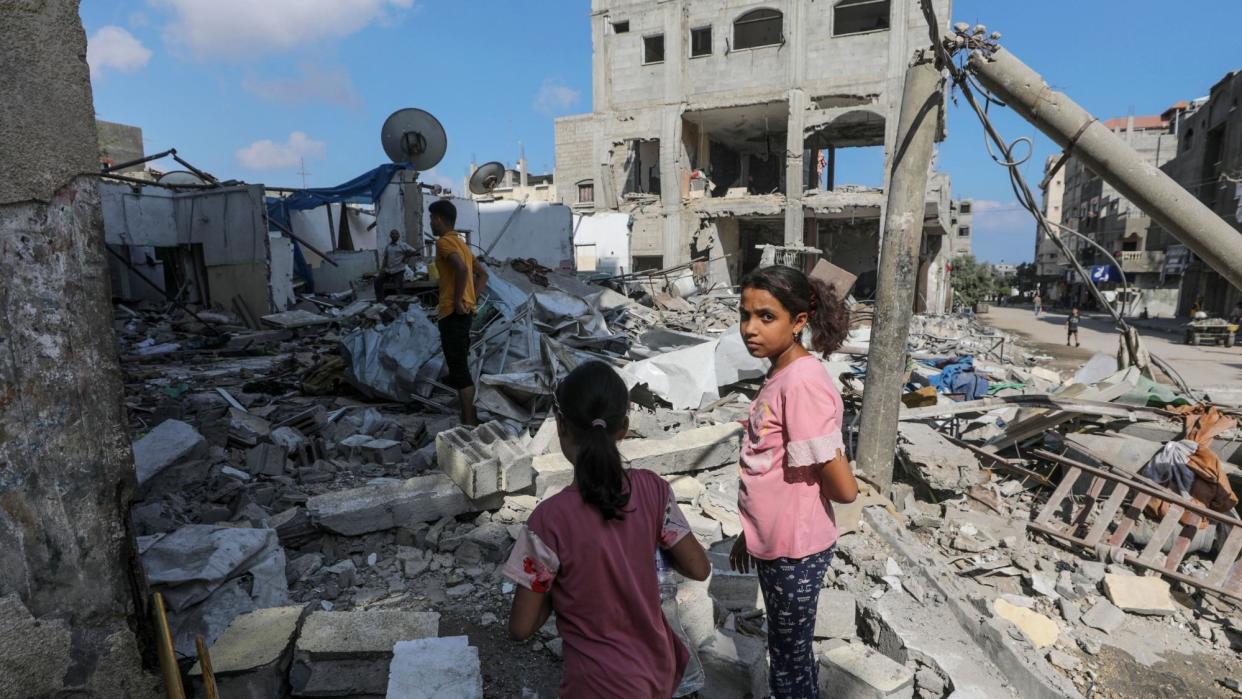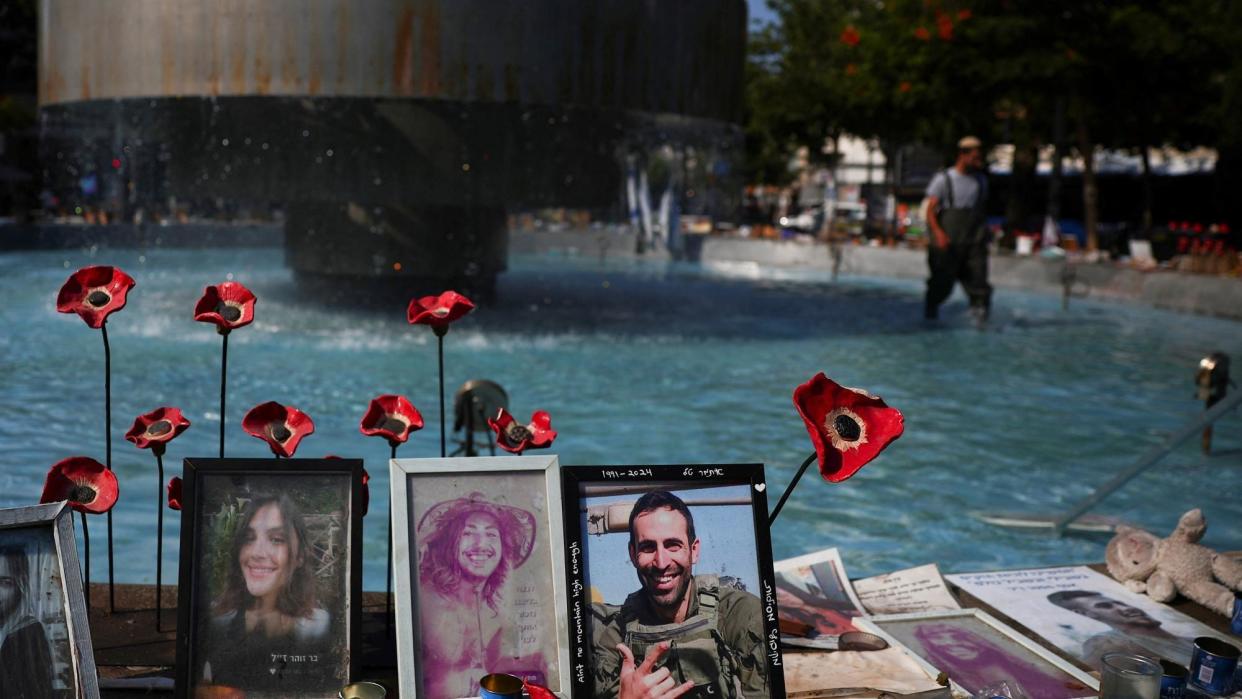Hamas will not join Gaza ceasefire talks, senior official says

A senior Hamas official told the BBC that it will not participate in the indirect talks on a Gaza ceasefire and hostage release deal due to resume in Doha on Thursday.
The Palestinian armed group wanted a roadmap for implementing the agreement and would “not engage in negotiations for the sake of negotiations in order to provide cover for Israel to continue its war”, the official said.
He reiterated that the roadmap should be based on the proposed deal outlined by US President Joe Biden at the end of May and accused Israel of adding “new conditions”.
Israel’s prime minister has denied doing so and said Hamas has been the one demanding changes.
The talks are still expected to take place even without Hamas, as US, Egyptian and Qatari mediators say they could use them to put together a plan that resolves the remaining issues.
They suffered several setbacks last month and have been suspended since Hamas's political leader and chief negotiator, Ismail Haniyeh, was assassinated in Tehran.
The US hopes that finalising a deal could deter Iran from retaliating for the assassination against Israel - which has neither confirmed nor denied involvement - and avert a regional conflict.
The US has ramped up its diplomatic efforts ahead of the talks.
On Wednesday, US Secretary of State Antony Blinken and Qatar's Prime Minister Mohammed bin Abdulrahman al-Thani said in a phone call that "no party in the region should take actions that would undermine efforts to reach a deal," a state department statement said. Mr Blinken also spoke separately to Egyptian Foreign Minister Badr Abdelatty, the state department said.
US President Joe Biden and Vice-President Kamala Harris were also briefed by their national security team on the latest developments in the Middle East, the White House said.
The Israeli military launched a campaign in Gaza to destroy Hamas in response to an unprecedented attack on southern Israel on 7 October, during which about 1,200 people were killed and 251 others were taken hostage.
More than 39,960 people have been killed in Gaza since then, according to the territory's Hamas-run health ministry.
Father says baby twins killed by Israeli strike in Gaza as he registered births
Hamas says guards killed hostage and wounded two others in Gaza
Last week, the leaders of the US, Egypt and Qatar issued a joint statement calling on Israel and Hamas to resume urgent discussions on a deal that would bring relief to the people of Gaza as well as the 111 remaining hostages, 39 of whom are presumed dead.
A framework agreement was "now on the table with only the details of implementation left to conclude", they said, adding that they were prepared to present a bridging proposal that overcame their differences if necessary.
Israel responded by saying it would send a team of negotiators to take part in Thursday’s talks. But Hamas - which is proscribed as a terrorist organisation by Israel, the UK and other countries - asked the mediators to present a plan based on where talks were a month and a half ago instead of engaging in any new rounds of negotiations.
On Wednesday, a senior Hamas official confirmed that its representatives would not attend the meeting, despite many of them being based in the Qatari capital.
“We want a roadmap to implement what we have already agreed based on President Biden’s ceasefire plan and the Security Council resolution, which guarantees Israel’s withdrawal from the Gaza Strip, specifically from the Philadelphi corridor [running along the border with Egypt], and allows the return of displaced persons to northern Gaza without restrictions, and allows the flow of humanitarian aid,” he told the BBC.
“It is Israel which added new conditions and reneged on its previous agreement,” he added.
The first phase of the deal outlined by Mr Biden on 31 May and endorsed by the UN Security Council would include a "full and complete ceasefire" lasting six weeks, the withdrawal of Israeli forces from populated areas of Gaza, and the exchange of some of the hostages - including women, the elderly and the sick or wounded - for Palestinian prisoners held in Israel.
The second phase would involve the release of all other living hostages and a "permanent end to hostilities". The third would see the start of a major reconstruction plan for Gaza and the return of dead hostages' remains.

On Tuesday, the New York Times reported that unpublished documents showed Israel had relayed a list of five new conditions in a letter on 27 July, which added to the principles it had set out on 27 May and Mr Biden presented days later.
It said the May proposal had talked of the “withdrawal of Israeli forces eastwards away from densely populated areas along the borders in all areas of the Gaza Strip”, but that the July letter had included a map indicating Israel would remain in control of the Philadelphi corridor.
The report also said the letter had added a stipulation that an agreed upon mechanism should be established to ensure only unarmed civilians returning to northern Gaza were allowed through the Israeli-controlled Netzarim corridor, which effectively divides the territory in two.
In response to the report, Israeli Prime Minister Benjamin Netanyahu’s office issued a statement saying the charge that he had added new conditions was “false”, describing them instead as “essential clarifications”.
“Prime Minister Netanyahu’s 27 July letter does not introduce extra conditions and certainly does not contradict or undermine the 27 May proposal. In fact, Hamas is the one that demanded 29 changes to the 27 May proposal, something the prime minister refused to do,” it added, without providing details about Hamas’s demands.
Later on Tuesday, President Biden conceded that the negotiations were “getting hard”, but vowed that he was “not giving up”.
He also said he believed an agreement would help avert the possibility of retaliation against Israel by Iran, Hamas’s main backer, for the assassination of Ismail Haniyeh.
When asked by a reporter if Iran “could... stop doing action if a ceasefire deal is possible”, he replied: "That's my expectation but we'll see."
Israel, which has neither confirmed nor denied involvement in the Hamas leader’s killing, has warned Iran that it would “exact a heavy price for any aggression”. Iran has dismissed Western calls for restraint and insisted that “a punitive response to an aggressor is a legal right”.
Haniyeh has been succeeded by Hamas's leader in Gaza, Yahya Sinwar, who was one of the masterminds behind the 7 October attack. Mr Netanyahu said on Monday that Sinwar "has been and remains the only obstacle to a hostage deal".






